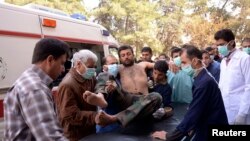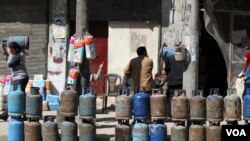TRIPOLI, LIBYA —
Syria’s government and rebels traded accusations Tuesday over reports of the use of a chemical weapon in the northwest of the city of Aleppo that killed more than 20 people and wounded another 80, with each side blaming the other for the attack.
A Reuters photographer touring hospitals in Aleppo said he had seen patients suffering breathing problems, who told him there was chlorine in the air immediately after the attack in Khan al-Assal.
"I saw mostly women and children," he told the wire agency. "They said that people were suffocating in the streets and the air smelled strongly of chlorine,” he reported after visiting the University of Aleppo hospital and the al-Rajaa hospital, both state-controlled.
The London-based Syrian Observatory for Human Rights, which monitors the conflict through contacts in Syria, put the number of dead in Tuesday’s attack at 26.
Syrian state media quickly announced that rebels fighting to oust President Bashar al-Assad fired a chemical weapon. Syria's Information Minister Omran al-Zoabi called the incident an "escalation," saying it was "dangerous shift in the course of what is taking place in Syria on the security and military levels.”
Rebel leaders angrily disputed the claim.
"We believe they fired a Scud with chemical agents," said Qassim Saadeddine. “The rebels were not behind this attack."
Other rebel leaders told VOA in telephone interviews that it would make no sense for them to launch a rocket strike on a city they largely controlled.
There has been no independent verification of a chemical attack. If confirmed, the attack would be the first verified use of chemical weapons in the brutal two-year conflict.
A White House spokesman said the Obama administration was "looking carefully" at allegations a chemical weapons attack had taken place, but added that so far there was "no evidence" to substantiate the claim.
The Syrian military has an extensive arsenal of chemical weapons, believed to include asphyxiants, blistering agents and choking agents like chlorine. There have long been worries that such chemical weapons could be used -- either by Assad loyalists or by rebels, if they managed to secure any stockpiles from Syrian military bases they overran.
President Barack Obama publicly warned Assad in December against any use of chemical weapons.
“The use of chemical weapons is, and would be, totally unacceptable,” Obama said. “If you make the tragic mistake of using these weapons, there will be consequences and you will be held accountable."
His warning was came after U.S. intelligence officials said there was evidence that chemical weapons components had been moved around the country and that they feared some precursor chemicals may have been mixed for possible use as weapons.
A British Foreign Office spokeswoman said Tuesday she was aware of the reports of possible chemical weapons use, saying that if proven, such a deployment would “demand a serious response from the international community and force us to revisit our approach so far.”
Britain and France have been lobbying other European Union countries to lift an arms embargo preventing EU countries from arming Syrian rebels.
Syrian officials have declined to confirm in the past that the regime possesses chemical weapons, but they have insisted that if they exist, they would be used only to defend against “foreign aggression” and not deployed in the civil war.
According to the claims of Information Minister al-Zoabi, rebels fired a rocket with a chemical warhead from Aleppo's southeastern district of Nairab at the town of Khan al-Assal. The rebels say Assad’s forces launched used a Scud missile with a chemical warhead during intense fighting in Khan al-Assal.
Story continues below photo gallery
Syrian state TV aired broadcast footage of what it said were casualties arriving at a hospital in Aleppo.
British chemical warfare expert Hamish Bretton-Gordon said Tuesday he gives little credence to claims by either side of a chemical weapons attack. He said Syrian government television video of the alleged casualties did not correspond with what one would expect to see in such a situation.
“In this particular case a rocket could have hit industrial toxic chemicals stored on the ground and caused their release, but none of the doctors treating patients in the hospitals are wearing any protective clothing, which is usually a good combat indicator. Without it they would be affected," said Bretton-Gordon, a former chemical warfare expert for the British defense ministry.
He added that the smell of chlorine was not a definitive indicator of chemical weapons use because, "you often get that in the vicinity of conventional explosions." He added that “chlorine has not really been used as a chemical weapon since the First World War – it is not very effective."
In related developments, exiled Syrian opposition leaders elected Ghassan Hitto Tuesday as prime minister of a government that would replace the Assad regime. The opposition government would be based on an interim basis in Syrian territory under rebel control.
Hitto has lived in the United States for years, but moved to Turkey last year to help coordinate aid to the rebels.
More than 100 countries have recognized the exiled opposition coalition Hitto now leads as the legitimate representative of the Syrian people. Among those nations are the United States, Britain, France and Turkey.
A Reuters photographer touring hospitals in Aleppo said he had seen patients suffering breathing problems, who told him there was chlorine in the air immediately after the attack in Khan al-Assal.
"I saw mostly women and children," he told the wire agency. "They said that people were suffocating in the streets and the air smelled strongly of chlorine,” he reported after visiting the University of Aleppo hospital and the al-Rajaa hospital, both state-controlled.
The London-based Syrian Observatory for Human Rights, which monitors the conflict through contacts in Syria, put the number of dead in Tuesday’s attack at 26.
Syrian state media quickly announced that rebels fighting to oust President Bashar al-Assad fired a chemical weapon. Syria's Information Minister Omran al-Zoabi called the incident an "escalation," saying it was "dangerous shift in the course of what is taking place in Syria on the security and military levels.”
Rebel leaders angrily disputed the claim.
"We believe they fired a Scud with chemical agents," said Qassim Saadeddine. “The rebels were not behind this attack."
Other rebel leaders told VOA in telephone interviews that it would make no sense for them to launch a rocket strike on a city they largely controlled.
There has been no independent verification of a chemical attack. If confirmed, the attack would be the first verified use of chemical weapons in the brutal two-year conflict.
A White House spokesman said the Obama administration was "looking carefully" at allegations a chemical weapons attack had taken place, but added that so far there was "no evidence" to substantiate the claim.
The Syrian military has an extensive arsenal of chemical weapons, believed to include asphyxiants, blistering agents and choking agents like chlorine. There have long been worries that such chemical weapons could be used -- either by Assad loyalists or by rebels, if they managed to secure any stockpiles from Syrian military bases they overran.
President Barack Obama publicly warned Assad in December against any use of chemical weapons.
“The use of chemical weapons is, and would be, totally unacceptable,” Obama said. “If you make the tragic mistake of using these weapons, there will be consequences and you will be held accountable."
His warning was came after U.S. intelligence officials said there was evidence that chemical weapons components had been moved around the country and that they feared some precursor chemicals may have been mixed for possible use as weapons.
A British Foreign Office spokeswoman said Tuesday she was aware of the reports of possible chemical weapons use, saying that if proven, such a deployment would “demand a serious response from the international community and force us to revisit our approach so far.”
Britain and France have been lobbying other European Union countries to lift an arms embargo preventing EU countries from arming Syrian rebels.
Syrian officials have declined to confirm in the past that the regime possesses chemical weapons, but they have insisted that if they exist, they would be used only to defend against “foreign aggression” and not deployed in the civil war.
According to the claims of Information Minister al-Zoabi, rebels fired a rocket with a chemical warhead from Aleppo's southeastern district of Nairab at the town of Khan al-Assal. The rebels say Assad’s forces launched used a Scud missile with a chemical warhead during intense fighting in Khan al-Assal.
Story continues below photo gallery
Syrian state TV aired broadcast footage of what it said were casualties arriving at a hospital in Aleppo.
British chemical warfare expert Hamish Bretton-Gordon said Tuesday he gives little credence to claims by either side of a chemical weapons attack. He said Syrian government television video of the alleged casualties did not correspond with what one would expect to see in such a situation.
“In this particular case a rocket could have hit industrial toxic chemicals stored on the ground and caused their release, but none of the doctors treating patients in the hospitals are wearing any protective clothing, which is usually a good combat indicator. Without it they would be affected," said Bretton-Gordon, a former chemical warfare expert for the British defense ministry.
He added that the smell of chlorine was not a definitive indicator of chemical weapons use because, "you often get that in the vicinity of conventional explosions." He added that “chlorine has not really been used as a chemical weapon since the First World War – it is not very effective."
In related developments, exiled Syrian opposition leaders elected Ghassan Hitto Tuesday as prime minister of a government that would replace the Assad regime. The opposition government would be based on an interim basis in Syrian territory under rebel control.
Hitto has lived in the United States for years, but moved to Turkey last year to help coordinate aid to the rebels.
More than 100 countries have recognized the exiled opposition coalition Hitto now leads as the legitimate representative of the Syrian people. Among those nations are the United States, Britain, France and Turkey.













